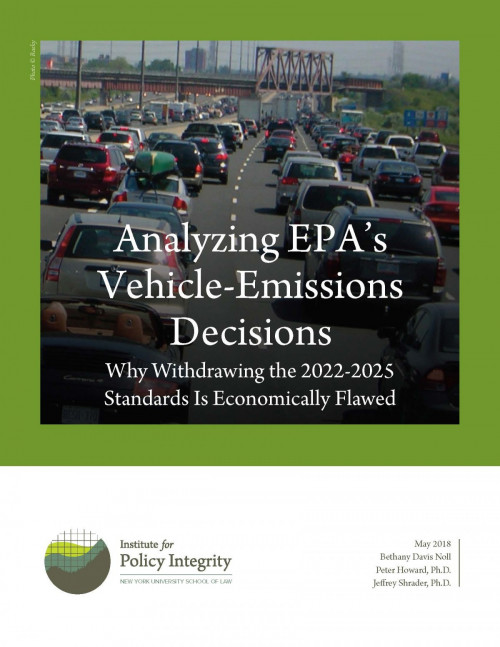-
New Tracking Resource: Health and Environmental Benefits Threatened by Deregulation
Our new tracking resource tallies the benefits to public health and the environment that are at risk due to regulatory repeals, delays, and revisions. Since 2017, numerous environmental rules have been the subject of the Trump administration’s deregulatory agenda. The original rules highlighted in our document were economically justified, meaning each was supported by a detailed account of its monetized benefits to the American public, which outweighed projected costs. Now, as the administration works to undo these rules, a wide range of crucial benefits could be lost. Our resource provides information on the kinds of benefits at risk, monetized gross and net benefit estimates, and other unquantified health and environmental effects of several federal rules.
-
Comments on Proposed Regulation to Require Drug Price Disclosures
The Centers for Medicare and Medicaid Services (CMS) recently proposed a rule that would require pharmaceutical companies to disclose the list prices of prescription drugs in television ads. We submitted comments pointing out flaws in the agency’s analysis of the proposal’s likely costs and benefits.
-
Comments on Homeland Security’s “Public Charge” Rule Affecting Applicants for Permanent Residency
The Department of Homeland Security (DHS) recently proposed a rule that would substantially expand DHS’s ability to deny applications for lawful permanent residency by deeming immigrants likely to become “public charges.” We submitted comments critiquing the cost-benefit analysis accompanying DHS’s proposal.
-
Comments on the Family Detention Rule
A recently proposed rule would allow the Department of Homeland Security to indefinitely detain immigrant children who enter the U.S. in the company of a parent or guardian. Under current law, such children must be released or transferred to a non-secure, state-licensed facility within 20 days. We filed comments critiquing the Department’s assessment of the costs and benefits of this policy change.
-
Court Vacates Delays of Department of Education’s Borrower Defense Rule
A United States District Judge recently ruled that the Department of Education’s repeated delays of the Borrower Defense Rule were illegal. We submitted an amicus brief in this case. This 2016 regulation was designed to help students who have been defrauded by for-profit educational institutions discharge their federal student loans. Under Secretary Betsy DeVos, the Department of Education delayed implementation of the Borrower Defense Rule three times, prompting a legal challenge.
-
Comments to HHS on Restricting Public Funding for Family Planning Services
The Department of Health and Human Services (HHS) recently issued a proposed rule that would revise implementing regulations for Title X of the Public Health Service Act (Title X), the country’s only publicly funded family planning, serving millions of women annually. Though the grant program is already bound by the legal limits on directly using federal grants to fund abortion services, the proposed rule now seeks to encumber entities that provide both Title X-eligible programs and abortion-related services with additional restrictions. Our comments focus on serious errors and oversights in the Department’s analysis of the Proposed Rule’s costs and benefits. First, HHS misstates and misapplies the standard for conducting a regulatory impact analysis under Executive Order 12,866. Second, HHS ignores the Proposed Rule’s potentially substantial indirect costs—most notably, the health consequences stemming from patients’ reduced access to healthcare services. Third, HHS fails to assess the distributional impacts of the Proposed Rule.
-
Comments to FDA on Limiting Nicotine Content of Cigarettes
As part of a larger plan to revise regulations on tobacco and nicotine, the U.S. Food and Drug Administration (FDA) is considering limiting the nicotine content of combusted cigarettes in an effort to make them less addictive. In response to FDA’s advance notice of proposed rulemaking on this potential policy, our comments offered advice, drawing from recent economic scholarship, on how the agency could assess a nicotine limit’s costs and benefits.
-
Brief on Department of Education’s Borrower Defense Rule
Under Secretary Betsy DeVos, the Department of Education has delayed implementation of the Borrower Defense Rule three times. This 2016 regulation was designed to help students who have been defrauded by for-profit educational institutions discharge their federal student loans. In our amicus brief to the U.S. District Court for the District of Columbia, we argue that the delays must be vacated because the Department failed to provide a reasoned explanation for any of them.
-

Analyzing EPA’s Vehicle-Emissions Decisions
Why Withdrawing the 2022-2025 Standards Is Economically Flawed
The Environmental Protection Agency sets greenhouse gas emissions standards for cars and light trucks, and it periodically reevaluates these standards to make sure that car manufacturers can comply. In April 2018, EPA withdrew its previous determination that standards for model year 2022–2025 vehicles were appropriate and would improve public welfare, now saying that more recent information suggests that the standards are too stringent. Our policy brief shows that EPA’s claim—that new information indicates that the assumptions underlying the previous determination are unrealistic—is not supported by the evidence. In fact, the opposite is the case. Recent trends in fuel prices, vehicle sales, automaker compliance, and safety all indicate that the existing 2022–2025 standards can be met at low cost while delivering large benefits to consumers and the economy. EPA’s decision to withdraw the standards will instead cause regulatory uncertainty that will hurt the automotive sector while also harming the environment.
-
Comments on Provider Conscience Rule
The Department of Health and Human Services (HHS) recently proposed a rule purporting to clarify the scope of statutory protections for medical providers who decline to participate in certain procedures, such as abortion or euthanasia, due to religious or moral objections. HHS issued a similar rule in 2008 but rescinded it in 2011 due to concern that the 2008 rule’s expansive definitions of statutory terms would lead providers to believe, incorrectly, that statutory protections extended not just to refusals to perform particular procedures, but also to refusals to care for particular types of patients, such as LGBTQ individuals. Our comments criticize HHS for reviving the 2008 rule’s expansive definitions without acknowledging its 2011 findings that such definitions would foster confusion and discrimination.
Viewing recent projects in Consumer and Healthcare Protection




